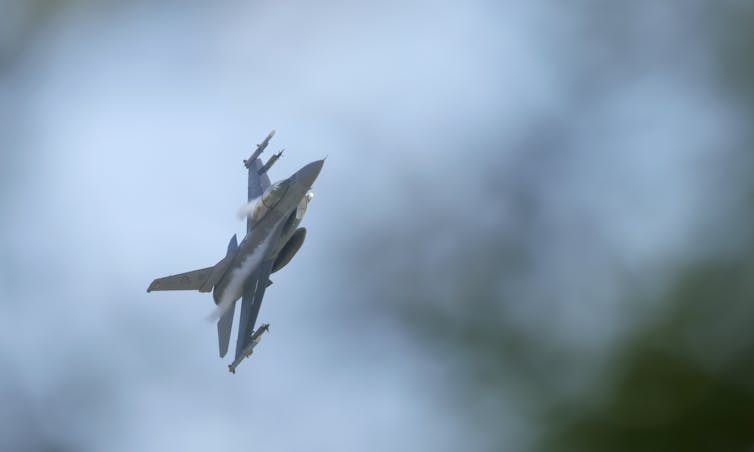F16s give Ukraine a fighting chance

After months of diplomatic pressure to supply Ukrainian forces with advanced fighter jets, European governments have agreed to supply F-16 aircraft to the Ukrainian air force.
The deal, under which Denmark and the Netherlands will provide Ukraine with about 40 of their F-16 fighters, has taken lengthy negotiations as the US was initially reluctant to give permission, something that was needed under the terms of the aircraft’s original sale to the European countries.
Despite the political agreements to supply Ukraine with these aircraft, significant challenges still remain before these fighters can be used in action in Ukraine – probably not until early 2024. The training of Ukrainian pilots on the F-16 began in earnest in August and will take several months. Meanwhile, changes to Ukraine’s military doctrine and operational principles and procedures will be needed.
But greater integration of western weapons systems, such as the F-16, will draw Ukraine further into Nato’s sphere of influence and logistical chain. In the case of the new fighter aircraft this is important as Ukraine’s airforce has until now mainly comprised older, Russian-built jets. This has made the acquisition of spare parts for maintenance and repair that much more difficult.
Air superiority
The F-16 is reckoned to be among the best and most manoeuvrable warplanes currently operating and will provide Ukrainian forces with an edge over the Russian warplanes that are currently dominating the skies over the combat zones.
Yuriy Ihnat, a spokesman for the Ukrainian air force, told Ukrainian TV recently that the F-16 is “capable of changing the course of events, capable of providing us with what is needed most today – air superiority over occupied territories”. He added that Russia had “around eight or nine fighters over occupied territories … dropping guided bombs and launching aviation missiles. With F-16, they won’t be able to do that… Air superiority is the key to success on the ground”.
The first major area in which Ukrainian forces will gain advantage as a result of of the F-16s will be in the continuing battle for control of the air. Currently, the Ukrainian air force is restricted to sending one to two jets on missions and these are conducted at low level in order to avoid Russian ground-based air defences and attack by the Russian air force.
The F-16 is better equipped to go up against Russia’s MiGs than the aircraft Ukraine has relied on until now. Having the edge when it comes to controlling the skies above the battlefield means Ukraine will gain the advantage when it comes to the air reconnaissance, crucial for understanding the battlefield.
The US air force (USAF) rates the F-16 as having a greater “combat radius” – meaning the distance it can fly to enter air combat, stay, fight and return – than anything Russia can put into the air.
Ground support
But it is not just in the skies that the F-16 can provide greater capabilities in the battle for control of the air. The air-to-ground capability available will give Ukraine the ability to target Russian ground-based air defence systems and either suppress or destroy them, further reducing the Russian control of the air.

Just as greater control of the air will hamper Russian reconnaissance activities, it will allow greater freedom of the skies for the Ukrainian air force to conduct these missions. A greater understanding of the battlefield and Russian defensive positions will allow commanders to plan with greater clarity for future operations.
Greater control of the air will give Ukraine greater scope to use its drones, which it has done to great effect in a tactical reconnaissance role and artillery-spotting role. The ability to deploy these in greater numbers can only increase the tactical control of operations enabling commanders to make decisions based on real-time information, and increase the lethality of its fighting on the ground.
An additional advantage that F-16 can give Ukraine in its war against Russia is the ability to attack long-range targets beyond the frontlines and operational zones. The F-16 has a range of over 500 miles, and, if armed with the Maverick missile, can hit targets up to 22 miles beyond its flight range.
This enhances the Ukrainian military’s ability to disrupt supply lines and the ability of Russian ground commanders to reinforce areas where Ukrainian ground troops are threatening to break through their lines. The ability to destroy or disrupt Russia’s local command and control centres is central to Ukrainian battle tactics.
Integration with NATO
Where the F-16 will have the greatest impact is perhaps not actually on the battlefield itself, but creating a situation where Ukraine adopts a more western-style of fighting, allowing greater cooperation with NATO in the future.
The deployment of the F-16 will change the character of the Russo-Ukrainian War, however it still appears that this will be a long attritional conflict that may not end for several years.
The F-16 will not win the conflict for Ukraine, but it will bolster its arsenal and provide a greater degree of capability and flexibility both in the air and on the battlefield.
This article was published by The Conversation.
Matthew Powell is a Teaching Fellow in Strategic and Air Power Studies at the University of Portsmouth. His first book, The Development of British Tactical Air Power, 1940-1943: A History of Army Co-operation Command, was published in 2016 by Palgrave Macmillan.













